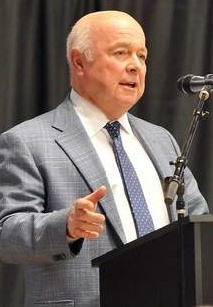From Mail Tribune
By Tim Trower
February 13, 2016
Danny Miles remembers a carefree youth of morning-to-evening baseball, of children running their own games, of the thrill of taking a big swing and a miss and not having to answer for it, of the joy of playing for fun and being, above everything, just a kid.

Oregon Tech men’s basketball coach Danny Miles addresses the crowd as the keynote speaker Thursday during the Southern Oregon Sports Commission awards ceremony. MAIL TRIBUNE / DENISE BARATTA
Miles, the retiring Oregon Tech men’s basketball coach who has amassed more than 1,000 victories, recounted those formative days in 1950s Medford while speaking at the Southern Oregon Sports Commission awards banquet Thursday at the Santo Community Center.
It was part nostalgia, conjuring images of a simple era characterized by Opie and The Beav, and part concern over today’s sports culture that blocks many kids before they get in tune with their potential.
In the pre-1950s, opportunities for minorities were few. Once those doors gradually creaked open, it was female participation that was under lock and key until the ’70s.
“Now we’re in the 2000s,” said Miles. “What’s our sports culture? I think we have the same kind of problems now, in a different way.”
He cited statistics by the National Alliance for Sports that show a staggering 70 percent of children drop out of organized sports by age 13.
There are lots of reasons: burnout from specialization and high expectations, increasing costs in a pay-to-play society that shackles middle- and lower-class families, injury due to inordinate physical demands on young bodies, the lure of less-regimented alternative sports, instruction by well-intentioned but under-qualified coaches.
Solutions are harder to identify.
A return to the idyllic times of yore isn’t likely, but Miles did visit with friends about possibilities prior to his presentation.
At the podium, he told of growing up at the corner of Portland Avenue and 10th Street. His father, Claude “Shorty” Miles, a former professional baseball player for whom Medford’s old Miles Field was named, built a backstop and a grass infield behind the house.
“We had a cow pasture for the outfield, the left-field fence was 210 (feet), the right-field fence 290,” said Miles.
It was the original “Miles Field” and, said Danny Miles, “about every kid in town played on it.”
“Some guy would rip one, hit it over the fence into the river, and everybody would drop their bats and gloves and take off for Bear Creek bridge,” he said. “We’d reach for a stick, pull it out and go back and play. And the guy would finish his home-run trot.”
He now calls it Charlie Brown baseball. No parents around. They played a 50-game schedule, organizing the games themselves, having the catcher call balls and strikes.
“Close play at first,” said Miles, “we worked it out, the kids worked it out. We kept stats and everything.”
At the same time, Medford started a program for kids that was “way ahead of other places,” said Miles.
A baseball school opened, and it was free. Parks and Recreation or the school district would pay high school coaches — legendary ones such as John Kovenz and Frank Roelandt — to provide instruction for little kids, said Miles.
The players were called sand blowers because they were so short, said Miles.
“I still am a sand blower,” he joked.
At 5, Miles said, he’d get on his bike, ride across Portland Avenue, over railroad tracks, and on to Spiegelberg Stadium. He’d get there 45 minutes early, “before everybody else. I couldn’t wait to play. I couldn’t sleep.”
They’d play awhile, then gravitate to the neighboring baseball diamond. They’d sit around home plate and listen to coaches teach them how to hold a bat with the trademark up, how to bone and scrape a bat, how to work in a glove, how to properly put on a uniform.
“We knew all that at 5, 6, 7 years old,” said Miles. “It was wonderful.”
Then they’d play. When finished, they’d make a beeline for “Miles Field” and play some more.
Soon enough, they realized there were limitations for some.
A girl was part of their group. When teams were picked, she’d go about fifth.
“She was a great player,” said Miles. “She played every sport with us. But as we got into junior high, she disappeared. We were getting bigger. We couldn’t play on the little field and stuff, and she never had a chance. She could have gone on to college and had a great opportunity, if the opportunity were there.”
Miles’ lifetime has been in sports. A star athlete, first at Medford High, where he graduated in 1963, then at Southern Oregon University. He followed that with barely-rivaled coaching success over 45 years.
He’s hosted 17,000 kids while operating basketball camps. He’s seen the culture of youth sports change. He’s lived it.
“The other day I heard a guy say his son is the third best player his age in the nation,” said Miles. “I said, ‘Well, how old is he?’ And he said 8. How do they do that?”
Miles said it will cost about $2,500 for his granddaughter to play summer softball.
Some youth baseball players are getting Tommy John surgery at age 14, 15, 16, he said, “which is ridiculous.”
Coaches and parents urge 12-year-olds to choose a sport in which to specialize.
Miles shook his head at the examples.
“Let them play, let them have fun,” he said.
He coached the Oregon Tech softball team for nine years and remembered the speech he gave when he took over.
“I said if you’re just here because your dad made you play softball for 12 years, you should quit,” said Miles. “The next day, two of my best players quit. Great speech.”
In today’s parent-driven youth sports atmosphere, it’s hard to find kids playing pick-up games like those of his rambunctious youth.
And he’s tried.
When his basketball camp ends, Miles has about 20 indoor-outdoor basketballs left over. He drives around Klamath Falls looking for kids playing on outdoor courts. If he finds one, he’ll give them a ball.
“I never found one in the last four years,” he said. “They’re inside doing other things. Kids don’t know how to play.”
He’d love to tackle the issue, sit down with like-minded people and try to provide opportunities, particularly for those compelled to leave sports about the time they become teenagers.
“The most important people are the children,” he said. “Let’s give all those children an opportunity to play ball and have some fun.
“I think it can be done.”
Reach sports editor Tim Trower at 541-776-4479, or email ttrower@mailtribune.com
ARTICLE URL >> Miles: Kids’ sports culture needs repair


